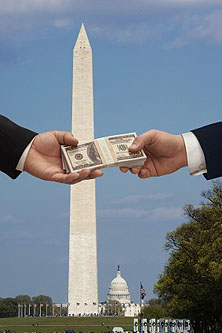 This is from yesterday, but I really can’t pass it up. Matea Gold and Tom Hamburger write in the Washington Post that presidential candidates are no longer much interested in “bundlers” who can raise a paltry million dollars or so for their campaigns. Terry Neese, a successful bundler for George W. Bush, is their poster child:
This is from yesterday, but I really can’t pass it up. Matea Gold and Tom Hamburger write in the Washington Post that presidential candidates are no longer much interested in “bundlers” who can raise a paltry million dollars or so for their campaigns. Terry Neese, a successful bundler for George W. Bush, is their poster child:
This year, no potential White House contender has called — not even Bush’s brother, Jeb. As of early Wednesday, the only contacts she had received were e-mails from staffers for two other likely candidates; both went to her spam folder.
“They are only going to people who are multi-multimillionaires and billionaires and raising big money first,” said Neese, who founded a successful employment agency. “Most of the people I talk to are kind of rolling their eyes and saying, ‘You know, we just don’t count anymore.’ ”
….In the words of one veteran GOP fundraiser, traditional bundlers have been sent down to the “minor leagues,” while mega-donors are “the major league players.”
The old-school fundraisers have been temporarily displaced in the early money chase because of the rise of super PACs, which can accept unlimited donations. This year, White House hopefuls are rushing to raise money for the groups before they declare their candidacies and have to keep their distance.
So does this matter? Does it matter whether candidates get contributions from a thousand millionaires vs. a hundred billionaires? Are their political views really very different?
In a way, I suppose not. Rich is rich. One difference, though, might be in the way specific industries get treated. If you take a ton of money from Sheldon Adelson or the Koch Brothers, you’re more likely to oppose internet gambling and specific energy-related regulations than you might be if you were simply taking money from a whole bunch of different gambling and energy millionaires.
On a broader note, though, it has the potential to alienate the electorate even more. Things are bad enough already, but when it becomes clear that presidential candidates are practically being bought and sold by a literal handful of the ultra-rich, how hard is to remain uncynical about politics? Pretty hard.
In the end, maybe this doesn’t matter so much. Big money is big money, and most people are already convinced that big money controls things in Washington DC. Still, as bad as things are, they can always get worse. Eventually, perhaps each successful candidate will be fully funded by a single billionaire willing to take a flyer with pocket money to see if they can get their guy elected. This is not a healthy world we’re building.
















